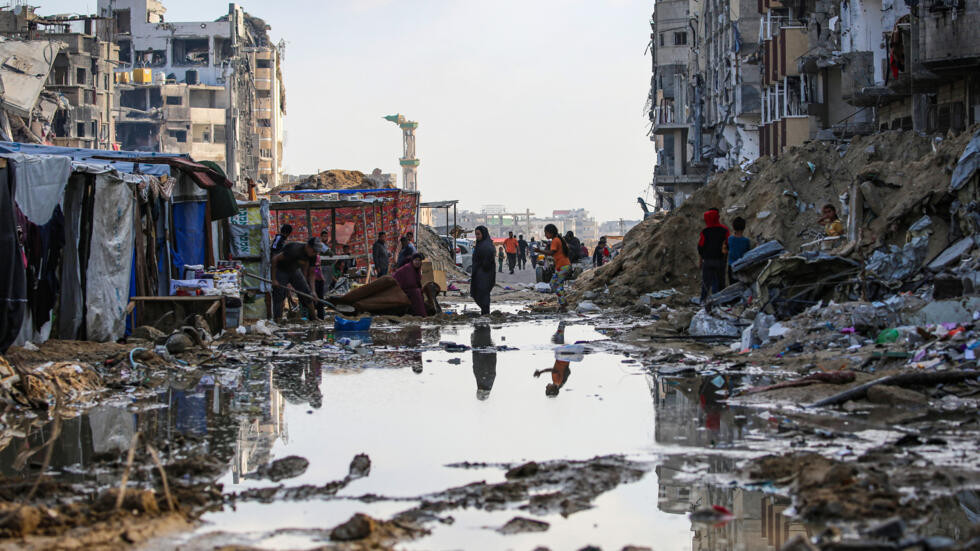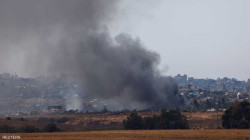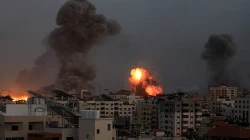Amnesty International accuses Israeli army of war crimes in Gaza

Shafaq News/ Amnesty International accused the Israeli army on Thursday of committing war crimes in Gaza by “unjustifiably destroying entire neighborhoods along the Gaza-Israel border to create a buffer zone.”
In its report, Amnesty stated that “between October 2023 and May 2024, along a border stretch measuring between 1 and 1.8 kilometers wide, over 90% of buildings were either destroyed or severely damaged, and 59% of agricultural crops were ruined. The damage covers an area of 58 square kilometers, or approximately 16% of Gaza’s total land area,” according to the report.
“The Israeli military’s relentless campaign of ruin in Gaza is one of wanton destruction. Our research has shown how Israeli forces have obliterated residential buildings, forced thousands of families from their homes and rendered their land uninhabitable,” said Erika Guevara-Rosas, Amnesty International’s Senior Director for Research, Advocacy, Policy and Campaigns.
“Our analysis reveals a pattern along the eastern perimeter of Gaza that is consistent with the systematic destruction of an entire area. These homes were not destroyed as the result of intense fighting. Rather, the Israeli military deliberately razed the land after they had taken control of the area.”
“The creation of any ‘buffer zone’ must not amount to the collective punishment of the Palestinian civilians who lived in these neighbourhoods. Israel’s measures to protect Israelis from attacks from Gaza must be carried out in conformity with its obligations under international law, including the prohibition of wanton destruction and of collective punishment.”
Israeli officials have acknowledged the destruction of structures along Gaza’s eastern perimeter as a security measure, in response to the attacks of 7 October 2023 by Hamas and other Palestinian armed groups, to protect Israeli communities from further attacks. The Israeli military has justified demolitions throughout Gaza saying it had destroyed tunnels and other “terror infrastructure”.
On 2 July 2024, Amnesty International sent questions regarding the demolitions to the Israeli authorities. At the time of publication, no response had been received.
Military Necessity
Amnesty International interviewed affected residents and farmers, analyzed satellite imagery, verified 25 videos filmed along the perimeter area, and tracked statements issued by the Israeli military, Hamas and other armed groups to determine whether the destruction was lawful, including whether it could be justified by imperative military necessity.
In four areas, the destruction was carried out after the Israeli military had operational control over the areas, meaning that it was not caused by direct combat between the Israeli military and Hamas and other Palestinian armed groups. In these parts of the Gaza Strip, “structures were deliberately and systematically demolished.”
It appears that many of the structures were demolished because of their proximity to the fence built by Israel to separate it from the Gaza Strip. While some of the structures were likely previously used by armed groups, the possible future use by armed groups of civilian objects – whether due to their proximity to the perimeter or for other reasons – does not in itself transform homes, schools, or mosques into military objectives. Furthermore, punitive demolition of civilian property solely because it has been used by armed groups is prohibited as a form of collective punishment.
International humanitarian law, which is binding on all parties to an armed conflict, prohibits destruction of property of an adversary unless it is required by imperative military necessity. Direct attacks on civilian objects are also prohibited.
The principle of military necessity allows a party to the conflict to take measures which are necessary to weaken the military forces of its adversary, and which are not otherwise prohibited by international humanitarian law. In the case of the prohibition of destruction of an adversary’s property, there is an explicit exception for “imperative military necessity”, allowing for destruction of property when it serves a legitimate military purpose and does not violate other rules of international humanitarian law including, amongst other things, the principle of proportionality and the prohibition of collective punishment.
If the Israeli military believed it was militarily necessary to establish a “buffer zone” to protect people inside Israel from attacks by armed groups, there appear to be other options in Israeli territory to achieve that objective that would comply with international humanitarian law and Israel’s obligations as the occupying power. Given the viability of these other options and the failure to pursue them, the extensive and systematic destruction is disproportionate to any possible legitimate military purpose. These cases should therefore be investigated as the war crime of wanton destruction. In light of the evidence that some destruction of homes and other civilian property was carried out to punish civilians for attacks by armed groups, this conduct should also be investigated as the war crime of collective punishment.
The International Court of Justice (ICJ) concluded in an Advisory Opinion in 2004 that Israel’s construction of the wall inside the occupied West Bank was unlawful. The ICJ emphasised that Israel’s security measures must comply with its obligations under international humanitarian law, and under international human rights law. This includes considering construction alternatives in Israeli territory that displace fewer civilians and provide fair reparations for those civilians who have lost property and livelihoods.
The prior military use of civilian structures does not alone justify demolition of civilian property, let alone excuse the wholesale destruction of entire neighbourhoods and of agricultural land required to feed the civilian population.
International Humanitarian Law
International humanitarian law, which applies in situations of armed conflict, including during military occupation, is comprised of rules whose central purpose is to limit, to the maximum extent feasible, human suffering in times of armed conflict.
The four Geneva Conventions of 1949 and their two Additional Protocols of 1977 are the principal instruments of international humanitarian law. Many of these treaties’ rules are considered customary international law, meaning that they bind all parties to an armed conflict regardless of whether they have ratified particular treaties and whether they are a state forces or a non-state armed group.
According to this customary norm, “the destruction or seizure of the property of an adversary is prohibited, unless required by imperative military necessity”. In addition, according to article 53 of the Fourth Geneva Convention, which regulates the actions of Israel as the occupying power in Gaza: “Any destruction by the Occupying Power of real or personal property belonging individually or collectively to private persons, or to the State, or to other public authorities, or to social or cooperative organizations, is prohibited, except where such destruction is rendered absolutely necessary by military operations.”
According to article 147 of the Fourth Geneva Convention, “extensive destruction and appropriation of property, not justified by military necessity and carried out unlawfully and wantonly” is a grave breach of the Convention, and thus a war crime.
Where such destruction is carried out as collective punishment, it also violates article 33 of the Fourth Geneva Convention which provides: “No protected person may be punished for an offence he or she has not personally committed. Collective penalties and likewise all measures of intimidation or of terrorism are prohibited.”
Civilian property in armed conflict is also protected by the principle of distinction, which requires that parties to the conflict at all times, distinguish between “civilian objects” and “military objectives” and direct their attacks only at military objectives.
According to customary international humanitarian law, civilian objects are all objects which are not “military objectives”; and military objectives are “limited to those objects which by their nature, location, purpose or use make an effective contribution to military action and whose partial or total destruction, capture or neutralisation, in the circumstances ruling at the time, offers a definite military advantage”. Civilian objects are protected against attack, unless and for such time as they become military objectives when all of the criteria for a military objective are temporarily fulfilled Protocol I requires that, in cases of doubt, parties to a conflict should presume that the structure retains its civilian nature. Intentionally directing attacks against civilian objects is a war crime.





